- Home
- M G Vassanji
The In-Between World of Vikram Lall Page 15
The In-Between World of Vikram Lall Read online
Page 15
He had completed primary school in Eldoret, after which he was sent as a promising student to the elite Alliance High School for Africans outside Nairobi, where he had made many friends, some of whom were leaders in government now. He was in his second year at Makerere University in Kampala. Deepa was finishing high school and I was attending university in Dar es Salaam. We were all on school holidays. We carefully avoided delving at length into our days in Nakuru, or mentioning the two friends we had lost. He agreed to come home with us later to see Mother and have lunch with our family.
Life had not been easy for my family when we arrived in Nairobi. Initially Papa opened an Indian grocery store in the busy Ngara shopping area, in partnership with his cousins. But he was alien to the business, and he found it demeaning. He who had sold Gorgonzola, Wiltshire and Camembert to European customers, and once even brought caviar for them, could never get used to the idea of sitting next to mounds of whole turmeric and garlic, his body marinating in a sweaty blend of a dozen spices by the end of the day (when they cremate me, he would complain to Mother, I’ll smell like chicken tandoori), telling people that yes, Monkey Brand charcoal tooth powder was better than Colgate and sat-isab-gol was a traditional remedy for indigestion recommended by ancient Indian yogis and infinitely superior to Eno’s Fruit Salts. The only consolation to his misery behind that shop till was the sweetmeat vendor next door, from whom he could order tea and jelebis. Within a year, as he would put it, the money he had brought from Nakuru was all eaten away.
Our life in Nairobi too was a vast departure from the intimate family life we had lived before in a small town. The city was a place of hustle and bustle, of high costs and many temptations. Papa had taken up with regulars at the Indian Gymkhana, and sometimes he came home late in the evenings, having played cards, smelling of whisky. There started to appear some strain between our parents. One or two times Aruna Auntie happened to be visiting him at his shop, and Mother worked up a scene at home, bringing up finally an old grievance she had harboured, that he had flirted ceaselessly with Aruna during her visit to Nakuru, when she had come to be introduced to Mahesh Uncle.
How easy it was to lose the certainty, the simplicity we had once possessed, despite that shadow of terror, in Nakuru: the school, the quiet afternoons, the Sunday family meals and stories, the walks to the railway station. Even the many quarrels of those times between my various uncles seemed like happy, comical interludes. Our saviour in the city came in the form of one Hari Sharma, recently from Punjab and Delhi and now an estate agent in Nairobi. Property’s where it’s at Ashok-ji, he told Papa; at independence time it’s property that changes hands, and the middle man takes away the profit—didn’t we see this in India-Pakistan! Don’t talk to me of faraway India-Pakistan, Papa replied, in typical fashion, but tell me more about the business here. Mr. Sharma did so, with the result that Papa joined Mayfair Estate Agents, and as Kenya’s independence approached and many Europeans put up their properties for sale, fortune smiled once more upon us. But that family contentment, that certainty of my early years, we had lost forever. Suddenly my parents seemed older and tired and disengaged from each other. The love and care I would see in her eyes for him had waned, one was more likely to see her irritated with him; his boyish joyfulness and vigour too were gone. But Nairobi had other pleasures. There were English movies at the Twentieth Century, Hindi ones at the Odeon and Shan, picnics at the National Park, the fetes at the Railway Club. And there was that feeling that you were moving with the times, in this atomic age, and if you were young, the sun was shining on you.
I had started attending the Duke of Gloucester School, a high school for Asians, where I distinguished myself in a few subjects, including geometry. I became a spin bowler for the school cricket team and was president of the stamp club; I was made prefect. We moved from the busy and older Ngara area of Nairobi to a more sedate and green Sixth Parklands, into a spacious bungalow in the shade of a jacaranda tree that became ours only because of Papa’s new business connections. The front veranda had a bench-swing of the sort common to many Indian homes, where I recall amidst the scents and soft sounds of the garden sitting by myself in the afternoons reading for my exams, or with Mother and Deepa before dinner waiting for Papa to come home.
If in our new home we spoke about our life in Nakuru, it was always with due caution, certain topics glossed over or gingerly trod upon as if one were on an unstable, narrow rope bridge that could twist and tangle and throw the unwary into the deep chasm below. Those topics had to do, naturally, with the Bruces, our memories of them and of our final, unhappy months there. Sometimes an inadvertent mention would escape from one of us; there would be an uncomfortable moment, a few words of response, and the subject would then quietly expire, like some lost traveller in an empty desert. We never went back to visit, though Dada and Dadi came on several occasions, as did our uncles, Papa’s brothers, and their families, for whom we had become the sophisticated city cousins. Mahesh Uncle was already in Nairobi, married. He had arrived a few years earlier, his luck having changed due to a sudden twist of fate. We did not see him very often.
Mother, Njoroge says he sent us letters to Nakuru and once even to Nairobi—didn’t you, Njo? We didn’t receive them, did we, Mother?
We had finally gathered in our sitting room, following luncheon, Deepa and I having brought Njoroge home straight after a lengthy session at the café. Deepa’s question was rhetorical, but Mother took it literally.
Don’t be silly! Arré paagal, if the letters came wouldn’t we have given them to you? They must have been lost, only.
My handwriting did leave something to be desired, I admit, said Njoroge pleasantly. Anyway, here I am in the flesh!
My brothers and my father too used the same post box, said Papa, to explain the mystery further, and who knows sometimes what happens to the mail when so many people use the same box number.
No matter, here I am, repeated Njoroge.
Yes, here you are! Deepa chimed.
A long-lost brother to Vikram and Deepa, Mother told him, beaming happily, and effervescent Deepa blinked rapidly and threw her a wry, almost condescending smile. Which Mother caught, colouring a little, and exchanged a fleeting look with Papa. My parents had their work cut out for them.
Mother now had a streak of premature grey in her hair; she was still young, only a year or two above forty. She had lost nothing of her smooth, fair complexion and ruddy cheeks of north India, but she was thinner and the eyes had perhaps withdrawn a bit, having borne the expressions of her frequent anxieties. Father looked considerably older and darker; his mouth was red from the paan-chewing habit he had picked up; he was balding.
Njoroge entertained us with tales about his schooldays—how the strict Catholic nuns of his primary school would rap his knuckles for getting a sum wrong or for writing badly; how he had to learn to eat with fork and knife and to do his own bed; and those showers he had to take at six in the morning every day with ice-cold water. But he had received much kindness and had even been sent to Europe during a holiday.
That caught Papa’s attention: London, eh?
His own dreams of going there had never materialized. He never spoke about them any more. Evidently the dreams now all belonged to the younger people, the opportunities were theirs.
London and Rome, Njoroge replied.
Now he was at Makerere, studying economics. He thought he would work in government following graduation; in the future perhaps he would go into politics. During the present holidays he was an assistant to the permanent secretary in the Ministry of Land Settlement, and in the previous month he had been travelling around Nyeri, investigating land claims. There was much confusion and bitterness, he explained to us, regarding land in the Kikuyu areas. Returning Mau Mau fighters and political detainees had found that their confiscated lands had been turned over in their absence to government collaborators, some of whom were now influential in the new government; the African cooperatives set up to buy land from
the white settlers needed loans and the prices demanded were under dispute. Kenya had a great future, it was one of the most advanced countries in Africa. But a lot of work needed to be done first, to lay the foundation for the future.
We all must have gaped at him as he spoke those words. You couldn’t help but wonder at his enthusiasm and ambition, the passion in those large eyes, and wonder too at how those words portrayed the passage of time: this used to be the boy who spoke bashfully and haltingly but proudly, the grandson of a gardener, who didn’t know much about his mother and father but knew that Jomo was his saviour. Here was now a young Kenyan of today, a leader of tomorrow. On the other hand, he couldn’t have seen us as very different from what we had been. We were his old friends, and sort of family; our concerns were mundane and ordinary; and we remained that enigma, the Asians of Africa.
Did they tell you about your grandfather, Njoroge? Mother asked.
Yes, Njoroge replied. They told me he had died in custody.
He gave her a grateful smile. Her maternal instincts, that essential kindness, had always reached out to him.
When the three of us arrived home earlier, she had been waiting for us near the door. She broke into a wide-eyed smile when he entered, unsure how to greet him, and he without hesitation had gathered her into his arms. Now he told her,
Mother, I often thought of you, all your kindness to me—all that food you always had for me, your gulab jamun and sakar pada and chappati—
He didn’t pronounce the words quite correctly, but Mother’s face turned red, she broke down and wept briefly.
We thought of you too, she said, looking up. We called you William at first, do you remember that? You were like a son to us, and a brother to my two.
Mother, said Deepa, can the three of us go to the Twentieth Century to see a movie—tomorrow afternoon?
The plan had been made earlier, during our drive home from the Rendezvous. This question too was rhetorical.
Later Papa and I drove Njoroge to the Donovan Maule Theatre, where he invited us for beers inside, at the bar, and introduced us to some of his friends. He was putting up not far away, sharing a university room with one of them. Then I drove Papa to the Gymkhana. On the way, he said to me casually, Njoroge’s a nice boy…it’s truly wonderful to have him back; but some things are not meant to be. I think you understand that, Vic. Your sister’s still immature, it’s your job to protect her as a brother.
I was taken aback; how swiftly had come this word of caution. It was a typically parental preemptive thing to do. He threw a glance at me, awaiting my response, and I nodded dutifully, without a word. Like many others of my generation, I was confident that our parents would have to change their ways in our new world. They would take their time, but they would surely change. For now, however, they were too inconsistent and confused about where they stood and who they were, even as they called themselves Kenyans.
I was surrounded by a sea of pure, soft whiteness, as if I had died and been reborn into a new, fairytale world of milky hue. Out back, the snow stretched on endlessly, across the lake, into the mist, and forever, in a scene reminiscent of the pictures of Siberia I have seen, I suppose, or of Antarctica; tree branches hung heavy with the fluffy whiteness, the house lay sunk in two feet of it. The doors were blocked, the phone line cut, the satellite dish out of service. Fortunately there was enough food in the house.
Thus marooned I subsisted for three days, not feeling inclined to dig myself out—into what, I asked myself in a blue moment—and unsure where to start when I was ready to do so. Finally the young father of the kids next door, Joseph’s two friends, came over on skis and called out cheerfully through the window: Are you there, are you all right? He helped me shovel a path to the gate, brought out his mechanical snowplough and cleared the driveway; I cleared the back porch. The phone people came, and in the evening a relieved Deepa came through, calling the umpteenth time, as she put it.
Seema Chatterji has gone to India on vacation.
One morning, some two weeks after Joseph’s departure, I walked into Korrenburg town and made straight for the library. There sat Seema, who had not called since she took Joseph to Toronto.
I might never have existed, I said in good-natured chiding, now that Joseph is gone.
Oh? she asked, raising a stern, bespectacled face.
You never called, I explained.
You could have. I was busy, I had things to take care of. As you had, I’m sure, with whatever it is you are up to.
I could have been stabbed in the chest, so unforeseen was the steely barb in her response. I supposed that she had learned more about me from Joseph and did not approve of what she heard. I made the best of the situation, with a few inane-sounding words, and fled. Is it such a big deal to come out and simply state what is bothering one, I asked myself. I thought North America was an open society, where people freely spoke their minds. I decided I was happy to be rid of such an inconstant acquaintance.
The following Sunday, however, she drove up and we had coffee. I could not warm to her, try as she would to be friendly. Finally, as she was leaving, she looked into my eyes and said, Are you always this unforgiving?
She has large, deep black eyes in that round expressive face of hers.
I’m not sure what you mean, I said, and she left.
Some days later she called in the afternoon and said, I actually came over the other day to make up. Ask forgiveness. Look, what I did, how I behaved when you came to the library, was unforgivable, I know—and I’m contradicting myself, aren’t I—it was rude, inconsiderate, unfair, cruel. All of those things. I don’t know what came over me, I assure you I am not like that as a rule. Look—
It’s all right, I said. Apology accepted.
We agreed to meet again, without actually fixing a date. We hung up.
I needed time to thaw. She had formed a definite opinion of me, she had judged me strongly and negatively, without giving me a chance to give my own account of myself. How could she tell me now that all that meant nothing? I did not care to be judged and un-judged at will. But I knew it must have taken a deep sense of honesty and decency to pick up the phone and make a lengthy apology.
Two weeks later I went into the library, and together we walked over to the café across from it and had coffee and cake as a sort of truce. She told me she is an Internet hound and had dug up the dirt on me from the archives of the East African and South African papers and London’s Economist. I told her, I am not really an evil man. I have not knowingly hurt anyone.
She waited for an explanation, I did not see the need to give her one.
THIRTEEN.
Njoroge called early one morning and said, Vic, if you are free this morning I’d like you to witness something important.
What?
Meet me in the city at nine, will you?
We agreed to meet downstairs outside Papa’s office building, next to the motorcycle repair shop, and when I reached there with my father at a little past nine, Njoroge was waiting for me impatiently. He shook hands with Papa and then the two of us set off at a pace. He was wearing his grey jacket, with a red shirt, but no tie today. It was a chilly morning.
Where to? I asked.
Uhuru Park, he replied. There’s a meeting there of former freedom fighters—Mau Mau, as they used to be called. You will see them up close! In fact, this is your chance to walk up to them and shake their hands! You know they’ve been coming out of the forest and surrendering. The problem the government faces is how to resettle them.
My noncommittal silence, as I struggled to keep pace with him, was not the response he’d expected, and he added forcefully, It’s a historic occasion, Vic. These people fought for our independence.
These were still the early days of our reunion. We were still rediscovering each other. His phone call earlier had reminded me of how he’d beckon at me from outside our back door in Nakuru and take me to share a secret for my ears only, how he’d taken me once to the Mau Mau oa
thing site behind our house to swear loyalty to Jomo and the cause of freedom. That was the day we had ritually mixed our blood.
We cut past the city market to Kenyatta Avenue and proceeded along it toward Uhuru Park, which lay on the other side of the city’s highway. At a lull in the traffic, we trotted across the six lanes of the highway and into the park.
There, said Njoroge, pointing with a finger in the direction we were headed.
In the centre of the park stood gathered a densely packed crowd of men. Behind them, some hundred yards away, had gathered a row of curious bystanders checked by a cordon of a few policemen, who allowed us through merely by our looks. Njoroge and I joined the inner crowd at its edge, but we were a distraction for our neighbours, and spaces gradually opened up before us and we found ourselves nudged forward to the front, where we were deemed to belong.
A few of them still in the thick spidery dreadlocks from their previous lives, one or two draped in a beloved animal skin or a greatcoat, some sporting beards, and all poor and dishevelled and dusty as hobos, the onetime Mau Mau amongst whom we stood looked listless, disgruntled, and weary. They had come here, away from the footlights of Parliament, to meet the Minister for Land Settlement, who had come provided with a padded chair for his ample bottom. He had not asked them to sit, and so they stood before him in a congregation; in any case the ground was damp from early morning rain. The minister—boss of my boss, Njoroge called him—was a round-faced man in a three-piece suit, flanked by assistants. At a spot a few feet to his left, spokesmen of the former fighters came forward, one by one, to deliver a short speech venting their grievances. They had only recently walked out of the forest, members of two gangs, having deposited their weapons at the Nyeri police station, and now they wanted to know where was the reward they had been promised when they left everything behind to go fight for freedom.

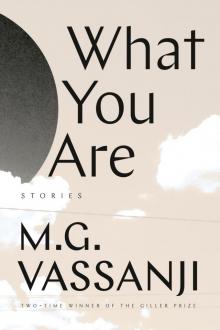 What You Are
What You Are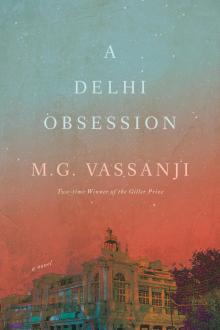 A Delhi Obsession
A Delhi Obsession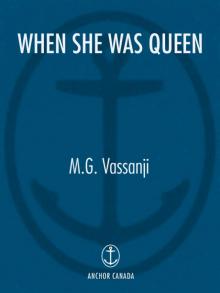 When She Was Queen
When She Was Queen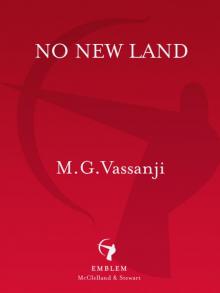 No New Land
No New Land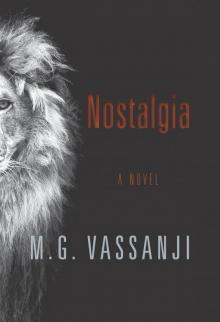 Nostalgia
Nostalgia Mordecai Richler
Mordecai Richler The Book of Secrets
The Book of Secrets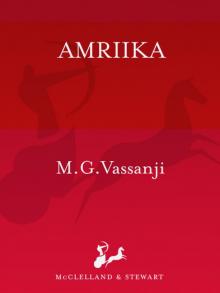 Amriika
Amriika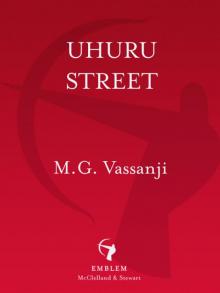 Uhuru Street
Uhuru Street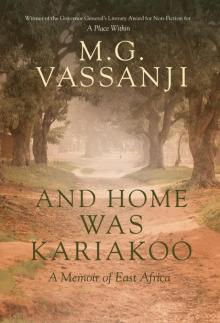 And Home Was Kariakoo
And Home Was Kariakoo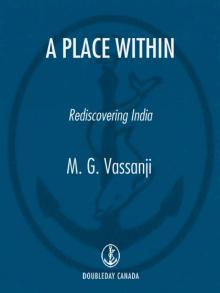 A Place Within
A Place Within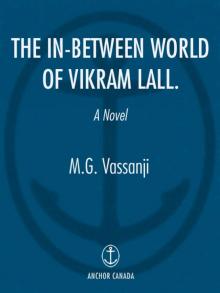 The In-Between World of Vikram Lall
The In-Between World of Vikram Lall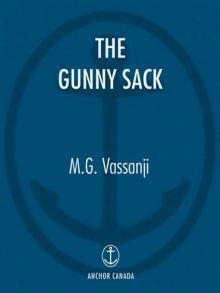 The Gunny Sack
The Gunny Sack